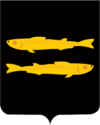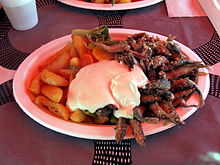- Coregonus albula
-
Coregonus albula 
Coregonus albula Conservation status Scientific classification Kingdom: Animalia Phylum: Chordata Class: Actinopterygii Order: Salmoniformes Family: Salmonidae Subfamily: Coregoninae Genus: Coregonus Species: C. albula Binomial name Coregonus albula
(Linnaeus, 1758)The vendace, Coregonus albula, is a species of freshwater whitefish in the family Salmonidae. It is also known as the European cisco. It is found in lakes in northern Europe, especially Finland, Sweden, Russia and Estonia, and in some lakes of the United Kingdom, northern Germany and Poland. It is found also in diluted brackish water in the Gulf of Finland and the Gulf of Bothnia of the Baltic Sea.[2]
Vendace mainly feed on zooplankton, such as small crustaceans and their larvae. The fish live in schools made up of large groups of individuals. They lay their eggs on pebbly or sandy ground. The length of an adult is normally about 25 centimetres (9.8 in). The maximum age reached by this fish is about ten years.
 Vendace or ryapushka in the coat of arms of Pereslavl-Zalessky, Russia
Vendace or ryapushka in the coat of arms of Pereslavl-Zalessky, Russia
The vendace is traditionally the most important target of freshwater fisheries in parts of Fennoscandia and Russia. Vendace roe is considered a delicacy and the famous Caviar of Kalix (Kalix vendace roe) is produced in the Swedish Bothnian Bay archipelago.
Taxonomy
According to FishBase, the British populations of vendace are a separate species, Coregonus vandesius,[3] but this distinction is not accepted by all scientists.[4]
Coregonus albula generally breeds in the autumn, but in several North European lakes distinct spring-spawning populations of vendace exist, some of which have been described as separate species: in Sweden, as Coregonus trybomi, and in two lakes of northern Germany, as Coregonus fontanae and Coregonus lucinensis. These populations are sympatric with autumn-spawning vendace, and seem to have evolved post-glacially from them independently in each lake.[5][6]
References
- ^ "Coregonus albula". IUCN Red List of Threatened Species. Version 2009.2. International Union for Conservation of Nature. 2008. http://www.iucnredlist.org/apps/redlist/details/5360.
- ^ Froese, Rainer, and Daniel Pauly, eds. (2009). "Coregonus albula" in FishBase. November 2009 version.
- ^ Froese, Rainer, and Daniel Pauly, eds. (2010). "Coregonus vandesius" in FishBase. January 2010 version.
- ^ Winfield, Ian J.; Fletcher, Janis M.; James, J. Ben (2004). "Conservation ecology of the vendace in Bassenthwaite Lake and Derwent Water, U.K.". Annales Zoologici Fennici 41: 155–164. http://www.sekj.org/PDF/anz41-free/anz41-155.pdf.
- ^ Schulz, M.; Freyhof, J. (October 2002). "Coregonus fontanae, a new spring-spawning cisco from Lake Stechlin, northern Germany (Salmoniformes: Coregonidae).". Icthyological Exploration of Freshwaters 14 (3): 209–216. ISSN 0936-9902. http://www.igb-berlin.de/abt4/mitarbeiter/freyhof/downloads/Coregonus.pdf.
- ^ Schulz, M.; Freyhof, J.; Saint‐Laurent, R.; Østbye, K.; Mehner, T.; and Bernatchez, L. (March 13, 2006). "Evidence for independent origin of two spring‐spawning ciscoes (Salmoniformes: Coregonidae) in Germany". Journal of Fish Biology 68 (A): 119–135. doi:10.1111/j.0022-1112.2006.01039.x. ISSN 0022-1112. http://www3.interscience.wiley.com/journal/118560058/abstract.

This Salmonidae article is a stub. You can help Wikipedia by expanding it.


